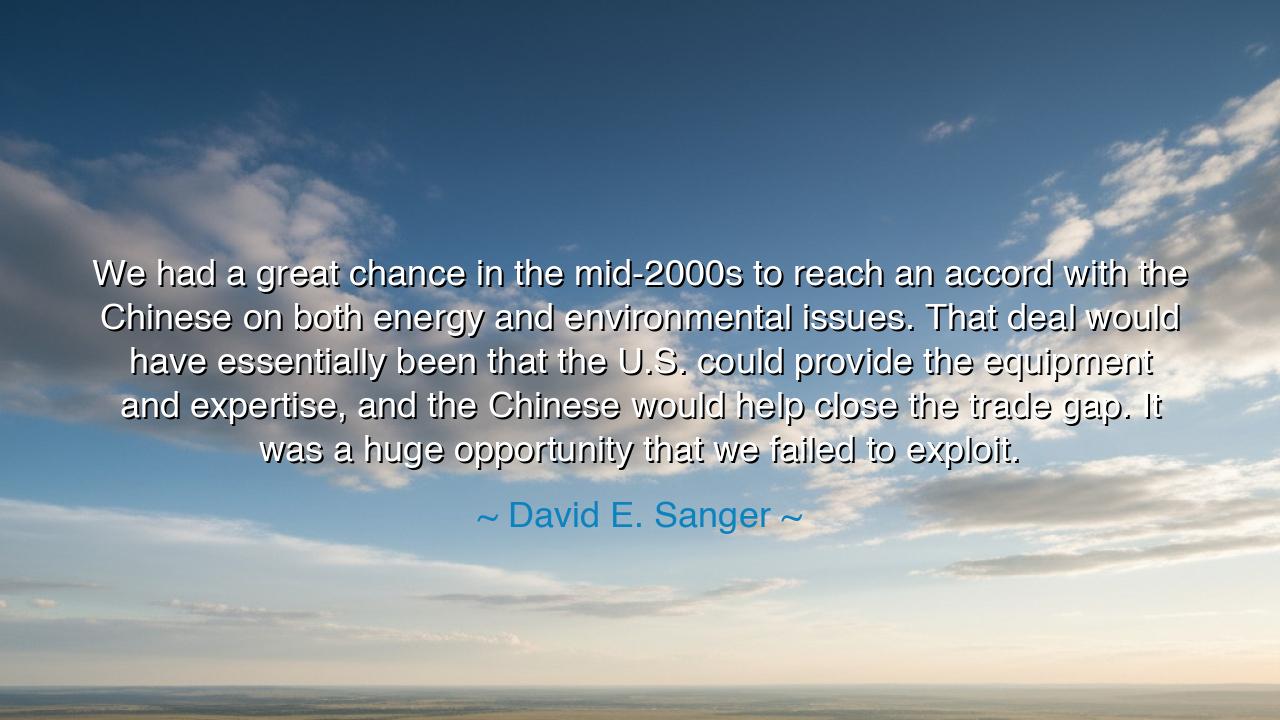
We had a great chance in the mid-2000s to reach an accord with
We had a great chance in the mid-2000s to reach an accord with the Chinese on both energy and environmental issues. That deal would have essentially been that the U.S. could provide the equipment and expertise, and the Chinese would help close the trade gap. It was a huge opportunity that we failed to exploit.






The words of David E. Sanger, historian of power and witness to the strategies of nations, resound with both sorrow and warning: “We had a great chance in the mid-2000s to reach an accord with the Chinese on both energy and environmental issues. That deal would have essentially been that the U.S. could provide the equipment and expertise, and the Chinese would help close the trade gap. It was a huge opportunity that we failed to exploit.” In this declaration lies the lament of a moment lost, a chance for two great powers to shape the future not only of their peoples, but of the entire world.
At the heart of his saying lies the recognition of opportunity squandered. In the mid-2000s, the United States stood as a leader in expertise and technology, while China surged in growth, hungry for energy, development, and trade. There, upon the table, was a chance for a grand bargain: to share knowledge of clean energy, to cooperate on environmental stewardship, and to ease the tension of economic imbalance. Such an accord would have forged a partnership where rivalry often threatened to prevail. Yet, as Sanger mourns, the chance passed—lost to hesitation, mistrust, or shortsightedness.
History is full of such moments, when alliances that might have altered the destiny of nations were left unrealized. Recall the time of Athens and Sparta before the Peloponnesian War. For a season, they stood together against Persia, bound by necessity and glory. But once the common foe receded, their failure to secure a lasting accord plunged Greece into decades of ruinous war. The lesson repeats: when opportunity for unity arises, failure to seize it leads to division, waste, and decline. Sanger’s words remind us that the same pattern unfolded in the modern age, where cooperation on energy and the environment could have been a bond against shared peril, but instead gave way to rivalry and suspicion.
The depth of his lament grows when we consider the stakes. The issues at hand were not only trade and economics, but the survival of the planet itself. For in those years, the shadows of climate change were lengthening, and the world’s two greatest powers had the means to change the course of history. Imagine a partnership where American technology met Chinese scale, where innovation was matched by implementation, and where the greatest emitters of carbon became leaders in preservation. Such a path, Sanger tells us, was open—but left unwalked.
The wisdom of his words also reminds us of the eternal truth: opportunity is fleeting. Nations, like individuals, are offered windows of chance—moments when the interests of rivals align, when the needs of both converge into harmony. But those windows do not remain forever. They are like doors blown open by a passing wind, which soon close again, leaving only regret. To miss them is to face not only stagnation, but the rising costs of what might have been prevented.
From this reflection emerges a lesson for the generations: never squander the chances to build bridges, especially when they unite power with responsibility, wealth with stewardship, and rivalry with cooperation. In your own life, when the chance comes to reconcile with a rival, to join hands on a greater cause, to solve a problem before it becomes a crisis—take it. For history is not shaped by endless waiting, but by the courage to seize the moment when it arrives.
Therefore, children of tomorrow, take Sanger’s warning into your hearts: when the chance arises to unite strength for the good of all, do not delay. Do not let mistrust or pride blind you to the greater horizon. For just as nations missed the chance to address energy, environment, and trade, so too may you miss the smaller chances in your life that could have borne great fruit. Seize the fleeting hour, for it may not return. And remember always: the cost of missed opportunity is not only regret—it is the burden that future generations must carry in your stead.






AAdministratorAdministrator
Welcome, honored guests. Please leave a comment, we will respond soon